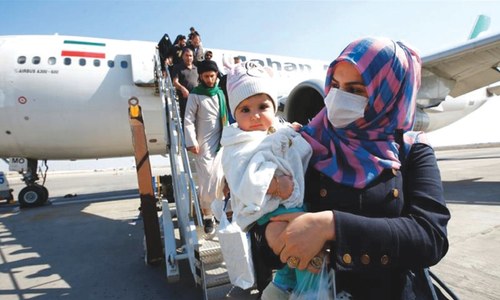
• WHO help sought to develop guidelines for Eidul Azha
• PM’s aide says screening of outbound passengers starts from Saturday
ISLAMABAD: While claiming that the health system has been ramped up with an unprecedented speed to cater to critical cases of the novel coronavirus, Pakistan on Thursday urged the global community to introduce a uniform policy for international air travel.
Moreover, the country sought the World Health Organisation’s (WHO) guidance and support to develop guidelines for upcoming Eidul Azha as cattle markets — due to more chances of human-to-human transmission of virus — can become a turning point towards disaster.
The suggestions were given by Special Assistant to the Prime Minister (SAPM) on Health Dr Zafar Mirza during a meeting held through video link with WHO Regional Director Dr Ahmed Al-Mandhari and his team of senior officials at the WHO Regional Headquarters in Cairo. The purpose of the meeting was to discuss Pakistan’s Covid-19 response and explore areas where the WHO could provide technical guidance and support to the country.
Speaking about commitment in Pakistan to fighting the disease, Dr Mirza said there was the highest level of uninterrupted political attention to a healthcare issue.
“Prime Minister Imran Khan heads the National Coordination Committee with all provincial chief ministers as members. Pakistan is implementing smart lockdowns rather than a generalised lockdown as the prime minister is cognisant of the financial hardship for around 25 per cent of the population living below the poverty line. Currently, 543 lockdowns are in place across Pakistan,” he said.
Dr Mirza, who was accompanied by head of the National Emergency Operation Centre Dr Rana Mohammad Safdar, said that as many as 35 standard operating procedures (SOPs) had been developed and the public was being educated through a strong risk communication initiative. He said strict action was being taken against those who did not adhere to the SOPs.
“We have ramped up our health system to cater to critical cases and done so with unprecedented speed. We are ensuring better governance and strong coordination to implement our National Action Plan against Covid-19 in letter and spirit,” he added.
According to a statement, the SAPM called for a global regime for air travel in the context of Covid-19 to allow for uniform policy across the world laying out specific requirements and conditions for international travel. He made special mention of the guidelines being developed for upcoming Eidul Azha by the government and sought the WHO regional chief’s guidance and support in this regard.
Meanwhile, the country reported 3,591 Covid-19 cases and 123 deaths over the past 24 hours, taking the national tally of cases to 194,613 and casualties to 3,931.
Screening of outbound passengers
SAPM on National Security Dr Moeed Yousaf said the screening process of all outbound passengers would start from Saturday (June 27), APP adds.
During a media briefing at the National Command and Operation Centre (NCOC), he said only healthy passengers would be allowed to board outgoing flights. He said the passengers going to other countries should comply with rules of the respective country and conduct Covid-19 test, if required by it.
He said that over 200,000 stranded Pakistanis would be brought back over the next two to three weeks. “From 40,000 to 45,000 stranded Pakistanis will return to the country every week through 270 flights,” he said, adding that the priority was to bring back the labourers stranded abroad, mostly in the Gulf countries.
He said that about 200,000 Pakistanis were stranded in various countries. Over 100,000 stranded Pakistanis had so far returned to the country, he added.
Meanwhile, Minister for Planning and Development Asad Umar, while talking to Dawn, said the country had taken quite satisfactory steps to deal with the pandemic. “Initially, we gave awareness to the masses and then we started taking strict steps to implement the SOPs. Now a policy of smart lockdown has been introduced due to which the number of daily cases has started decreasing. However, we have been examining the situation closely as it cannot be said with surety that the cases will not increase in coming days. Lockdowns, which have been enforced in different areas of country, are for 14 days and after completion of the period we will consider if it [lockdown] should be extended,” he said.
Violations of health guidelines
According to data released by the National Command and Operation Centre (NCOC), there are 1,542 ventilators across the country, of which 571 are occupied. Moreover, 8,837 violations of health guidelines/instructions were observed across the country during the last 24 hours due to which more than 887 markets/shops and seven industrial units were sealed and 1,513 transporters were fined and vehicles impounded.
During a budget debate in the National Assembly, Parliamentary Secretary of National Health Services Dr Nausheen Hamid said the country had the capacity to conduct over 70,000 Covid-19 tests daily, but due to lack of human resources up to 35,000 tests were being conducted. “We have started training of the staff due to which soon we will be able to hold 50,000 tests per day. Moreover, manufacturing of N-95 masks has started in Pakistan and 1,100 oxygenated beds will be arranged by the end of the current month,” she said.
Emergency response project
A meeting held at the Planning Commission approved a Covid-19 health emergency response project for which $20 million financing has been provided by AFD (Agency Francaise de Development).
According to a statement, the meeting, chaired by Deputy Chairman of the Planning Commission Mohammad Jahanzeb Khan, was informed that the AFD funds for the health project would be utilised for effective and efficient Covid-19 case management, upgrade of the existing health facilities or setting up new facilities where needed, and strengthening the capacity of health workforce.
The funds will also be used for strengthening of health management systems — inventory control, disease surveillance, standard protocols, etc — as well as provision of equipment to meet the national requirements.
Published in Dawn, June 26th, 2020













































